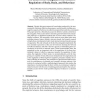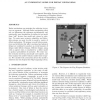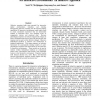34 search results - page 5 / 7 » Modeling Culturally and Emotionally Affected Behavior |
CONNECTION
2010
13 years 5 months ago
2010
Abstract. Despite the great amount of knowledge produced by the neuroscientific literature affective phenomena, current models tackling noncognitive aspects of behavior are often b...
WSC
2000
13 years 9 months ago
2000
Defeat mechanisms are strategies for achieving victory over an opponent. Although defeat mechanisms often rely on influencing the opponent psychologically and emotionally, most si...
LREC
2008
13 years 9 months ago
2008
This paper reports on the creation of the multimodal NIMITEK corpus of affected behavior in human-machine interaction and its role in the development of the NIMITEK prototype syst...
CHI
2009
ACM
2009
ACM
Social immersive media: pursuing best practices for multi-user interactive camera/projector exhibits
14 years 8 months ago
Based on ten years' experience developing interactive camera/projector systems for public science and culture exhibits, we define a distinct form of augmented reality focused...
AIIDE
2006
13 years 9 months ago
2006
Affective reasoning holds great potential for interactive digital entertainment, education, and training. Incorporating affective reasoning into the decision-making capabilities o...



